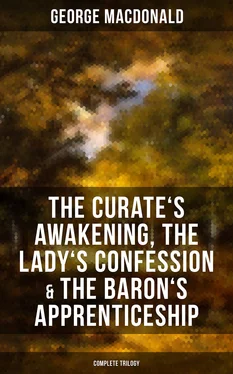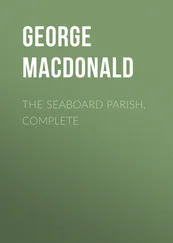"Thank you! thank you, sister dear!" he answered, pressing her to his bosom: "that is the first word of real comfort you have spoken to me. I shall not be afraid if you go with me."
It was indeed a comfort to both of them to remember that there was this alternative equally to the gallows and a long life of gnawing fear and remorse. But it was only to be a last refuge of course. Helen withdrew to the dressing-room, laid herself on her bed, and began to compass how to meet and circumvent the curate, so as by an innocent cunning to wile from him on false pretences what spiritual balm she might so gain for the torn heart and conscience of her brother. There was no doubt it would be genuine, and the best to be had, seeing George Bascombe, who was honesty itself, judged the curate an honest man. But how was it to be done? She could see only one way. With some inconsistency, she resolved to cast herself on his generosity, and yet would not trust him entirely.
She did not go downstairs again, but had her tea with her brother. In the evening her aunt went out to visit some of her pensioners, for it was one of Mrs. Ramshorn's clerical duties to be kind to the poor—a good deal at their expense, I am afraid—and presently George came to the door of the sick-room to beg her to go down and sing to him. Of course, in the house of a dean's relict, no music except sacred must be heard on a Sunday; but to have Helen sing it, George would condescend even to a hymn tune; and there was Handel, for whom he professed a great admiration! What mattered his subjects? He could but compose the sort of thing the court wanted of him, and in order to that, had to fuddle his brains first, poor fellow! So said George at least.
That Leopold might not hear them talking outside his door, a thing which no invalid likes, Helen went downstairs with her cousin; but although she had often sung from Handel for his pleasure, content to reproduce the bare sounds, and caring nothing about the feelings both they and the words represented, she positively refused this evening to gratify him. She must go back to Leopold. She would sing from The Creation if he liked, but nothing out of The Messiah would she or could she sing.
Perhaps she could herself hardly have told why, but George perceived the lingering influence of the morning's sermon, and more vexed than he had ever yet been with her, for he could not endure her to cherish the least prejudice in favour of what he despised, he said he would overtake his aunt, and left the house. The moment he was gone, she went to the piano, and began to sing, "Comfort ye." When she came to "Come unto me," she broke down. But with sudden resolution she rose, and, having opened every door between it and her brother, raised the top of the piano, and then sang, "Come unto me," as she had never sung in her life. Nor did she stop there. At the distance of six of the wide-standing houses, her aunt and cousin heard her singing "Thou didst not leave," with the tone and expression of a prophetess—of a Maenad, George said. She was still singing when he opened the door, but when they reached the drawing-room she was gone. She was kneeling beside her brother.
CHAPTER XVIII.
TWO LETTERS.
Table of Contents
The next morning, as Wingfold ate his breakfast by an open window looking across the churchyard, he received a letter by the local post. It was as follows:—
"Dear Mr. Wingfold, I am about to take an unheard-of liberty, but my reasons are such as make me bold. The day may come when I shall be able to tell you them all. Meantime I hope you can help me. I want very much to ask your counsel upon a certain matter, and I cannot beg you to call, for my aunt knows nothing of it. Could you contrive a suitable way of meeting? You may imagine my necessity is grievous when I thus expose myself to the possible bitterness of my own after judgment. But I must have confidence in the man who spoke as you did yesterday morning. I am, dear Mr. Wingfold, sincerely yours, Helen Lingard.
"P.S.—I shall be walking along Pine Street from our end, at eleven o'clock to-morrow."
The curate was not taken with a great surprise. But something like fear overshadowed him at finding his sermons come back upon him thus. Was he, an unbelieving labourer, to go reaping with his blunt and broken sickle where the corn was ripest! But he had no time to think about that now. It was nearly ten o'clock, and she would be looking for her answer at eleven. He had not to think long, however, before he saw what seemed a suitable plan to suggest; whereupon he wrote as follows:
"Dear Miss Lingard, I need not say that I am entirely at your service. But I am doubtful if the only way that occurs to me will commend itself to you. I know what I am about to propose is safe, but you may not have sufficient confidence in my judgment to accept it as such.
"Doubtless you have seen the two deformed persons, an uncle and niece, named Polwarth, who keep the gate of Osterfield Park. I know them well, and, strange as it may seem, I must tell you, in order that you may partake of my confidence, that whatever change you may have observed in my public work is owing to the influence of those two, who have more faith in God than I have ever met with before. It may not be amiss to mention also that, although poor and distorted, they are of gentle blood as well as noble nature. With this preamble, I venture to propose that you should meet me at their cottage. To them it would not appear at all strange that one of my congregation should wish to see me alone, and I know you may trust their discretion. But while I write thus, with all confidence in you and in them, I must tell you that I have none in myself. I feel both ashamed and perplexed that you should imagine any help in me. Of all I know, I am the poorest creature to give counsel. All I can say for myself is that I think I see a glimmer of light, and light is light, through whatever cranny, and into whatever poverty-stricken chamber, it may fall. Whatever I see I will say. If I can see nothing to help you, I will be silent. And yet I may be able to direct you where to find what I cannot give you. If you accept my plan, and will appoint day and hour, I shall acquaint the Polwarths with the service we desire of them. Should you object to it, I shall try to think of another. I am, dear Miss Lingard, yours very truly, Thomas Wingfold."
He placed the letter between the pages of a pamphlet, took his hat and stick, and was walking down Pine Street as the Abbey clock struck eleven. Midway he met Helen, shook hands with her, and, after an indifferent word or two, gave her the pamphlet, and bade her good morning.
Helen hurried home. It had required all her self-command to look him in the face, and her heart beat almost painfully as she opened the letter.
She could not but be pleased—even more than pleased with it. If the secret had been her own, she thought she could have trusted him entirely; but she must not expose poor Leopold.
By the next post the curate received a grateful answer, appointing the time, and expressing perfect readiness to trust those whom he had tried.
She was received at the cottage door by Rachel, who asked her to walk into the garden, where Mr. Wingfold was expecting her. The curate led her to a seat overgrown with honeysuckle.
CHAPTER XIX.
ADVICE IN THE DARK.
Table of Contents
It was some moments before either of them spoke, and it did not help Wingfold that she sat clouded by a dark-coloured veil. At length he said,
"You must not fear to trust me because I doubt my ability to help you. I can at least assure you of my sympathy. The trouble I have myself had enables me to promise you that."
"Can you tell me," she said, from behind more veils than that of lace, "how to get rid of a haunting idea?"
Читать дальше












